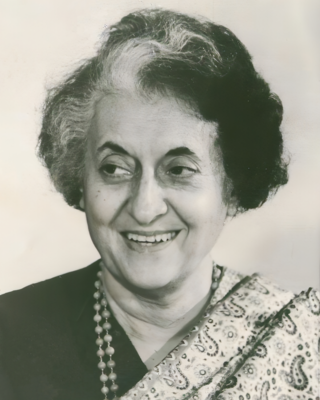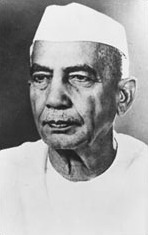
Indira Gandhi was an Indian politician who served as the third Prime Minister of India from 1966 to 1977 and again from 1980 until her assassination in 1984. She was India's first and, to date, only female prime minister, and a central figure in Indian politics as the leader of the Indian National Congress. Gandhi was the daughter of Jawaharlal Nehru, the first prime minister of India, and the mother of Rajiv Gandhi, who succeeded her in office as the country's sixth prime minister. Furthermore, Gandhi's cumulative tenure of 15 years and 350 days makes her the second-longest-serving Indian prime minister after her father. Henry Kissinger described her as an "Iron Lady", a nickname that became associated with her tough personality since her lifetime.

Morarji Ranchhodji Desai was an Indian independence activist and politician who served as the 4th Prime Minister of India between 1977 and 1979 leading the government formed by the Janata Party. During his long career in politics, he held many important posts in government such as Chief Minister of Bombay State, Home Minister, Finance Minister and 2nd Deputy Prime Minister of India.

Chaudhary Charan Singh was an Indian politician and a freedom fighter who served as the 5th Prime Minister of India from 1979 to 1980 and the 3rd Deputy Prime Minister of India from January 1979 to July 1979. He served as 5th Chief Minister of Uttar Pradesh as a member of Bhartiya Kranti Dal. Charan Singh is known for his land and agricultural reform initiatives. He is widely regarded as the "Champion of farmers" after his life has been dedicated to advocating for the wellbeing and rights of farmers. He is the first leader outside the Indian National Congress who formed government in the northern India and became 5th chief minister of Uttar Pradesh.
Events in the year 1975 in the Republic of India.

The Janata Party abbreviated JP, lit. People's Party) is an unrecognized political party in India. It was founded as an amalgam of Indian political parties opposed to the Emergency that was imposed between 1975 and 1977 by Prime Minister Indira Gandhi of the Indian National Congress. In the 1977 general election, the party defeated the Congress and Janata leader Morarji Desai became the first non-Congress prime minister in independent modern India's history.

Sanjay Gandhi was an Indian politician and the younger son of Indira Gandhi and Feroze Gandhi. He was a member of parliament, Lok Sabha and the Nehru–Gandhi family.
Socialist Party has been the name of several political parties in India, all of which have their roots in the Congress Socialist Party during the freedom struggle.

The Indian National Congress (Organisation) also known as Congress (O) or Syndicate/Old Congress was a political party in India formed when the Congress party split following the expulsion of Indira Gandhi.

The Emergency in India was a 21-month period from 1975 to 1977 when Prime Minister Indira Gandhi had a state of emergency declared across the country.

Justice Jagmohanlal Sinha was an Indian judge known for his 1975 ruling in the State of Uttar Pradesh v. Raj Narain lawsuit, which invalidated the election of Prime Minister Indira Gandhi.

Navnirman Andolan was a socio-political movement in 1974 in Gujarat by students and middle-class people against economic crisis and corruption in public life. It is the only successful agitation in the history of post-independence India that resulted in dissolution of an elected government of the state.

Raj Narain was an Indian freedom fighter and politician. He won in a famous electoral malpractice case against the then Prime Minister Indira Gandhi, which led to her disqualification and imposition of Emergency in India in 1975. He defeated Indira Gandhi during the 1977 Lok Sabha elections.
The Bihar movement, also known as the JP movement, was a political movement initiated by students in the Indian state of Bihar against misrule and corruption in the state government. in 1974. It was led by the veteran Gandhian socialist Jayaprakash Narayan, popularly known as JP. The movement later turned against Indian Prime Minister Indira Gandhi's government in the central government. It was also referred to as Sampoorna Kranti.
The 39th Amendment of the Constitution of India, enacted on 10 August 1975, placed the election of the President, the Vice President, the Prime Minister and the Speaker of the Lok Sabha beyond the scrutiny of the Indian courts. It was passed during the Emergency of 1975–1977. It was moved by the Congress government headed by Indira Gandhi to preempt a hearing by Supreme Court of India concerning the setting aside of Gandhi's election by the Allahabad High Court on the grounds of corrupt electoral practices.

Hans Raj Khanna was an Indian judge, jurist and advocate who propounded the basic structure doctrine in 1973 and attempted to uphold civil liberties during the time of Emergency in India in a lone dissenting judgement in 1976. He entered the Indian judiciary in 1952 as an Additional District and Sessions Judge and subsequently was elevated as a judge to the Supreme Court of India in 1971 where he continued till his resignation in 1977.

Satyendra Narayan Sinha was an Indian politician and statesman, participant in the Indian independence movement, a leading light of Jaya Prakash Narayan's ‘complete revolution’ movement during the Emergency and a former Chief Minister of Bihar. Affectionately called Chhote Saheb, he was also a seven-time Member of Parliament from the Aurangabad constituency, a three-term Member of the Bihar Legislative Assembly, and a Member of the Bihar Legislative Council once. Regarded to be one of India's most influential regional people of the time, his reputation was synonymous with being a strict disciplinarian and tough taskmaster.

General elections were held in India between 1 and 10 March 1971 to elect members of the fifth Lok Sabha. They were the fifth general elections since independence in 1947. The 27 Indian states and union territories were represented by 518 constituencies, each with a single seat. Under the leadership of Indira Gandhi, the Indian National Congress (R) led a campaign which focused on reducing poverty and won a landslide victory, overcoming a split in the party and regaining many of the seats lost in the previous election.

General elections were held in India between 16 and 20 March 1977 to elect the members of the sixth Lok Sabha. The elections took place during the Emergency period, which expired on 21 March 1977, shortly before the final results were announced.

Rae Bareli is one of the 80 Lok Sabha (parliamentary) constituencies in the northern Indian state of Uttar Pradesh. It is considered to be a bastion of the Indian National Congress. From 1967 to 1977, the seat was held by former Prime Minister Indira Gandhi, and from 2004 until her appointment to the Rajya Sabha in 2024, by Sonia Gandhi.
The Janata Morcha was a coalition of Indian political parties formed in 1974 to oppose the government of Indian Prime Minister Indira Gandhi and her Congress (R) party. The coalition was an integral part of the popular movement against the Emergency rule of Indira Gandhi and the direct predecessor of the Janata Party, which defeated the Congress (R) in the 1977 Indian general election to form the first non-Congress government in independent India. It was formed by Jayaprakash Narayan and Morarji Desai, chief of the main opposition Congress (O) party.













